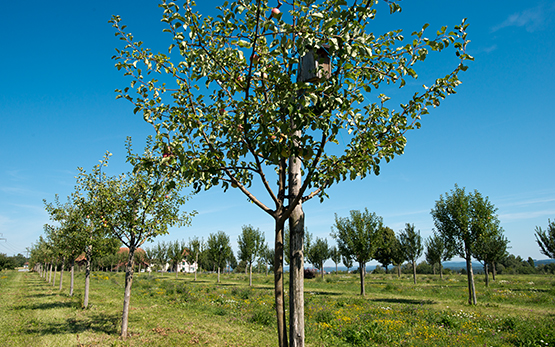IP-SUISSE and Agroscope have developed a point system whose aim is to show what climate protection measures farmers can implement effectively on their farms.
The climate protection points system seeks to reduce the greenhouse gas emissions of IP-SUISSE label farms by 10% compared to current levels. In a previous paper, Alig et al. (2015) compiled a catalogue of climate protection measures for farms. Analyses using pilot farms have shown that the reduction target is difficult to achieve with the current climate protection measures from that paper. An extended catalogue of measures is necessary in order to provide farmers with additional climate protection measures and to achieve the envisaged reduction target.
Nine further potentially effective climate protection measures were selected for the calculation and the effects on the environment were determined. To this end, each measure was simulated on four model farms. Using life cycle assessment methodology, the greenhouse gas emissions on the individual model farms were calculated for each measure and compared with the farm without the measure. The results were used to derive the theoretical greenhouse gas savings of each measure. In addition, further environmental impacts were calculated in order to show trade-offs.
The Climate Protection Measures led to Greenhouse Gas Savings
On average, the climate protection measures led to greenhouse gas savings of 113 kg to 10,653 kg CO2 eq. per farm, equivalent to 0.03% to 23.05% of a farm’s greenhouse gas emissions. Measures in the area of crop production (agroforestry system, field application of biochar, green manures) and the measure wood pellet heating achieved the highest greenhouse gas savings. In comparison, the savings due to energy measures (milking system frequency converter, heat recovery during milk cooling, regular replacing of mower blades) and animal husbandry measures (linseed as a feed additive, recycling of silo plastic) were generally lower.
Based on the analysis of uncertainties and trade-offs with other environmental impacts, five measures can be recommended unconditionally for implementation on farms (energy measures and recycling of silo plastic). For the remaining four measures (field application of biochar, agroforestry system, linseed as a feed additive, green manures), there are greater uncertainties in the assumptions made for the calculation, or there were larger unfavourable effects on other environmental areas (trade-offs). The latter measures can be recommended only to a limited extent for implementation in practice.
The measures linseed as a feed additive and green manures cannot be recommended from an environmental point of view.






